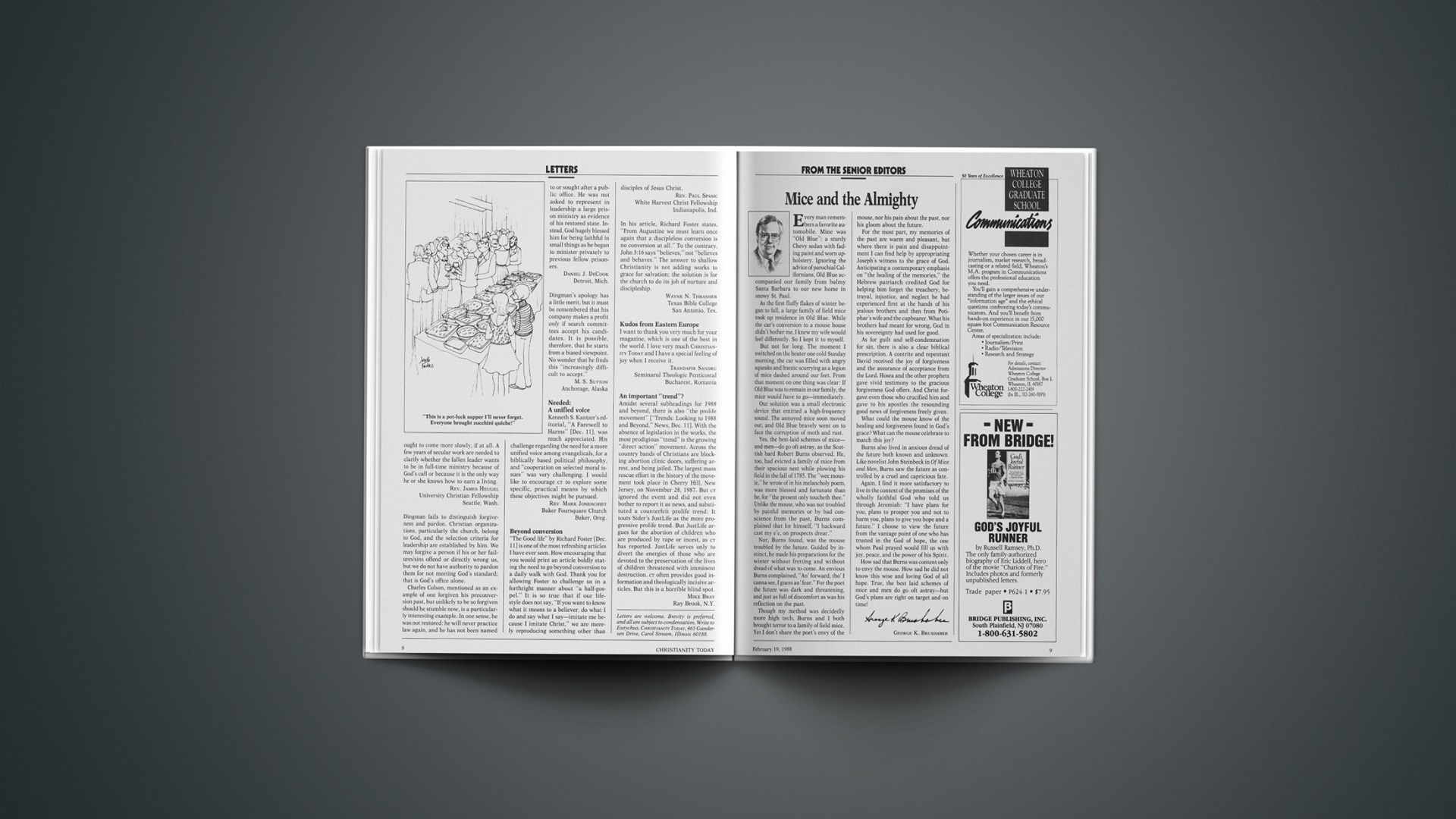Every man remembers a favorite automobile. Mine was “Old Blue”: a sturdy Chevy sedan with fading paint and worn upholstery. Ignoring the advice of parochial Californians, Old Blue accompanied our family from balmy Santa Barbara to our new home in snowy St. Paul.
As the first fluffy flakes of winter began to fall, a large family of field mice took up residence in Old Blue. While the car’s conversion to a mouse house didn’t bother me, I knew my wife would feel differently. So I kept it to myself.
But not for long. The moment I switched on the heater one cold Sunday morning, the car was filled with angry squeaks and frantic scurrying as a legion of mice dashed around our feet. From that moment on one thing was clear: If Old Blue was to remain in our family, the mice would have to go—immediately.
Our solution was a small electronic device that emitted a high-frequency sound. The annoyed mice soon moved out, and Old Blue bravely went on to face the corruption of moth and rust.
Yes, the best-laid schemes of mice—and men—do go oft astray, as the Scottish bard Robert Burns observed. He, too, had evicted a family of mice from their spacious nest while plowing his field in the fall of 1785. The “wee mousie,” he wrote of in his melancholy poem, was more blessed and fortunate than he, for “the present only toucheth thee.” Unlike the mouse, who was not troubled by painful memories or by bad conscience from the past, Burns complained that for himself, “I backward cast my e’e, on prospects drear.”
Nor, Burns found, was the mouse troubled by the future. Guided by instinct, he made his preparations for the winter without fretting and without dread of what was to come. An envious Burns complained, “An’ forward, tho’ I canna see, I guess an’ fear.” For the poet the future was dark and threatening, and just as full of discomfort as was his reflection on the past.
Though my method was decidedly more high tech, Burns and I both brought terror to a family of field mice. Yet I don’t share the poet’s envy of the mouse, nor his pain about the past, nor his gloom about the future.
For the most part, my memories of the past are warm and pleasant, but where there is pain and disappointment I can find help by appropriating Joseph’s witness to the grace of God. Anticipating a contemporary emphasis on “the healing of the memories,” the Hebrew patriarch credited God for helping him forget the treachery, betrayal, injustice, and neglect he had experienced first at the hands of his jealous brothers and then from Potiphar’s wife and the cupbearer. What his brothers had meant for wrong, God in his sovereignty had used for good.
As for guilt and self-condemnation for sin, there is also a clear biblical prescription. A contrite and repentant David received the joy of forgiveness and the assurance of acceptance from the Lord. Hosea and the other prophets gave vivid testimony to the gracious forgiveness God offers. And Christ forgave even those who crucified him and gave to his apostles the resounding good news of forgiveness freely given.
What could the mouse know of the healing and forgiveness found in God’s grace? What can the mouse celebrate to match this joy?
Burns also lived in anxious dread of the future both known and unknown. Like novelist John Steinbeck in Of Mice and Men, Burns saw the future as controlled by a cruel and capricious fate.
Again, I find it more satisfactory to live in the context of the promises of the wholly faithful God who told us through Jeremiah: “I have plans for you, plans to prosper you and not to harm you, plans to give you hope and a future.” I choose to view the future from the vantage point of one who has trusted in the God of hope, the one whom Paul prayed would fill us with joy, peace, and the power of his Spirit.
How sad that Burns was content only to envy the mouse. How sad he did not know this wise and loving God of all hope. True, the best laid schemes of mice and men do go oft astray—but God’s plans are right on target and on time!
GEORGE K. BRUSHABER










